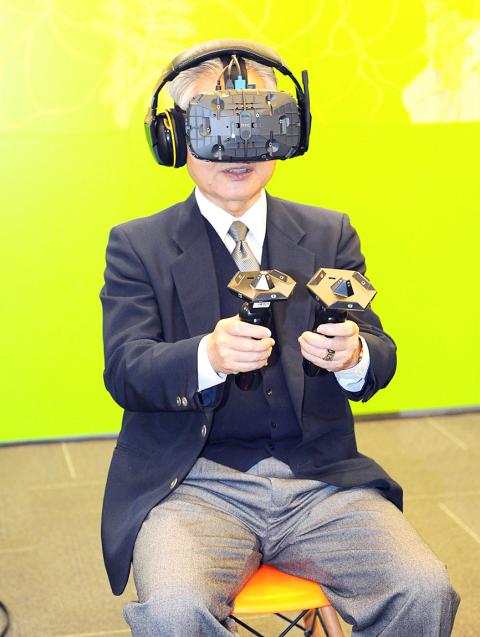HTC Corp’s (宏達電) stock price dropped 13.11 percent this week, dragged down by the company’s announcement that it was postponing the launch of its first virtual reality headset from this month to April next year.
The stock, which opened lower this week, continued its downtrend to close at NT$69 in Taipei trading yesterday, after it announced the delay on Tuesday.
The company said it planned to make an additional 7,000 units of the HTC Vive available to developers at the beginning of next year, and launch its commercial version in April.

Photo: EPA
The announcement sparked market concern about the company’s preparation and strategy for its new wearable product lineup, as HTC had said the headset would hit the market this quarter.
The company yesterday said it decided to delay the launch because it was in the process of making a technological breakthrough.
“It was a tough decision to make, as we could have started to ship Vive this month, but after discussing it with Valve, our strategic partner, we decided that we can offer a more technologically advanced product if we postpone it for another quarter,” the Chinese-language Apple Daily quoted HTC chairperson Cher Wang (王雪紅) as saying in an interview published yesterday.
Wang said she understood the public disappointment over the delay, but the company made the decision to be able to offer buyers a better user experience.
HTC announced the Vive headset prototype, which it codeveloped with US-based video game developer Valve, in March this year.
HTC chief financial officer Chang Chia-lin (張嘉臨) has said that the company expects its non-smartphone segment, which includes the Vive headset, to contribute as much as 10 percent to overall revenues next year.
However, as pre-orders have been delayed to the end of February next year and commercial shipment scheduled to start in April, HTC will only start to see revenue contribution from the new product in the second quarter.
Deutsche Bank AG thinks Vive is a technologically excellent product, but believes the company’s VR headset development is just in the early stages.
“Vive is not enough for HTC to stage a meaningful turnaround,” Deustche Bank analyst Birdy Lu (呂家霖) said in a client note on Nov. 30.
Due to weaker-than-expected smartphone demand, HTC posted a net loss of NT$4.4 billion (US$133.4 million), or a loss per share of NT$5.41, for last quarter, marking its second consecutive quarter of losses this year.
Cumulative sales in the first 11 months of the year reached NT$115.16 billion, plummeting 33.32 percent from NT$172.76 billion in the same period last year.

US sports leagues rushed to get in on the multi-billion US dollar bonanza of legalized betting, but the arrest of an National Basketball Association (NBA) coach and player in two sprawling US federal investigations show the potential cost of partnering with the gambling industry. Portland Trail Blazers coach Chauncey Billups, a former Detroit Pistons star and an NBA Hall of Famer, was arrested for his alleged role in rigged illegal poker games that prosecutors say were tied to Mafia crime families. Miami Heat guard Terry Rozier was charged with manipulating his play for the benefit of bettors and former NBA player and

The DBS Foundation yesterday announced the launch of two flagship programs, “Silver Motion” and “Happier Caregiver, Healthier Seniors,” in partnership with CCILU Ltd, Hondao Senior Citizens’ Welfare Foundation and the Garden of Hope Foundation to help Taiwan face the challenges of a rapidly aging population. The foundation said it would invest S$4.91 million (US$3.8 million) over three years to foster inclusion and resilience in an aging society. “Aging may bring challenges, but it also brings opportunities. With many Asian markets rapidly becoming super-aged, the DBS Foundation is working with a regional ecosystem of like-minded partners across the private, public and people sectors

BREAKTHROUGH TECH: Powertech expects its fan-out PLP system to become mainstream, saying it can offer three-times greater production throughput Chip packaging service provider Powertech Technology Inc (力成科技) plans to more than double its capital expenditures next year to more than NT$40 billion (US$1.31 billion) as demand for its new panel-level packaging (PLP) technology, primarily used in chips for artificial intelligence (AI) applications, has greatly exceeded what it can supply. A significant portion of the budget, about US$1 billion, would be earmarked for fan-out PLP technology, Powertech told investors yesterday. Its heavy investment in fan-out PLP technology over the past 10 years is expected to bear fruit in 2027 after the technology enters volume production, it said, adding that the tech would

YEAR-END BOOST: The holiday shopping season in the US and Europe, combined with rising demand for AI applications, is expected to drive exports to a new high, the NDC said Taiwan’s business climate monitor improved last month, transitioning from steady growth for the first time in five months, as robust global demand for artificial intelligence (AI) products and new iPhone shipments boosted exports and corporate sales, the National Development Council (NDC) said yesterday. The council uses a five-color system to measure the nation’s economic state, with “green” indicating steady growth, “red” suggesting a boom and “blue” reflecting a recession. “Yellow-red” and “yellow-blue” suggest a transition to a stronger or weaker condition. The total score of the monitor’s composite index rose to 35 points from a revised 31 in August, ending a four-month